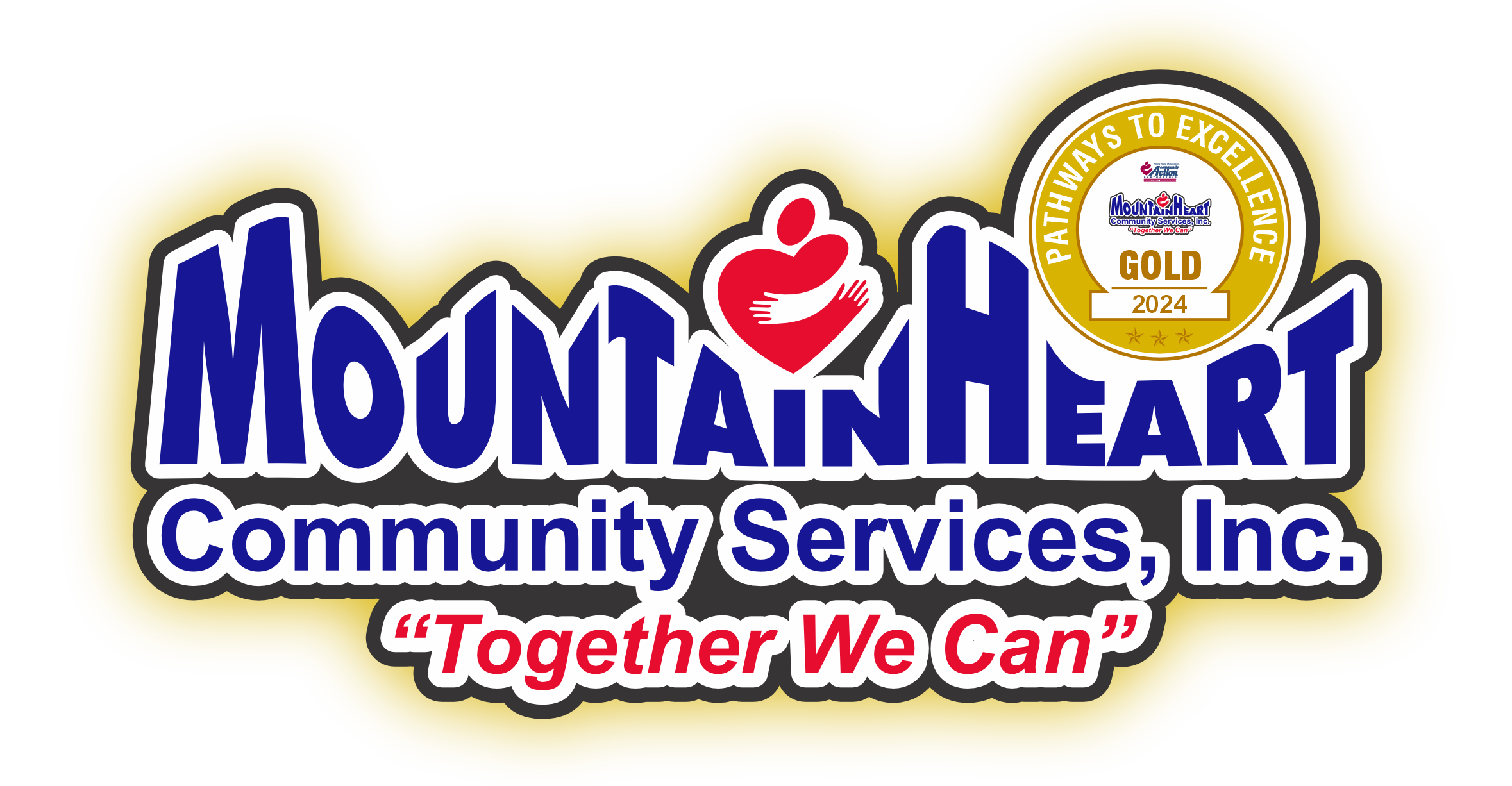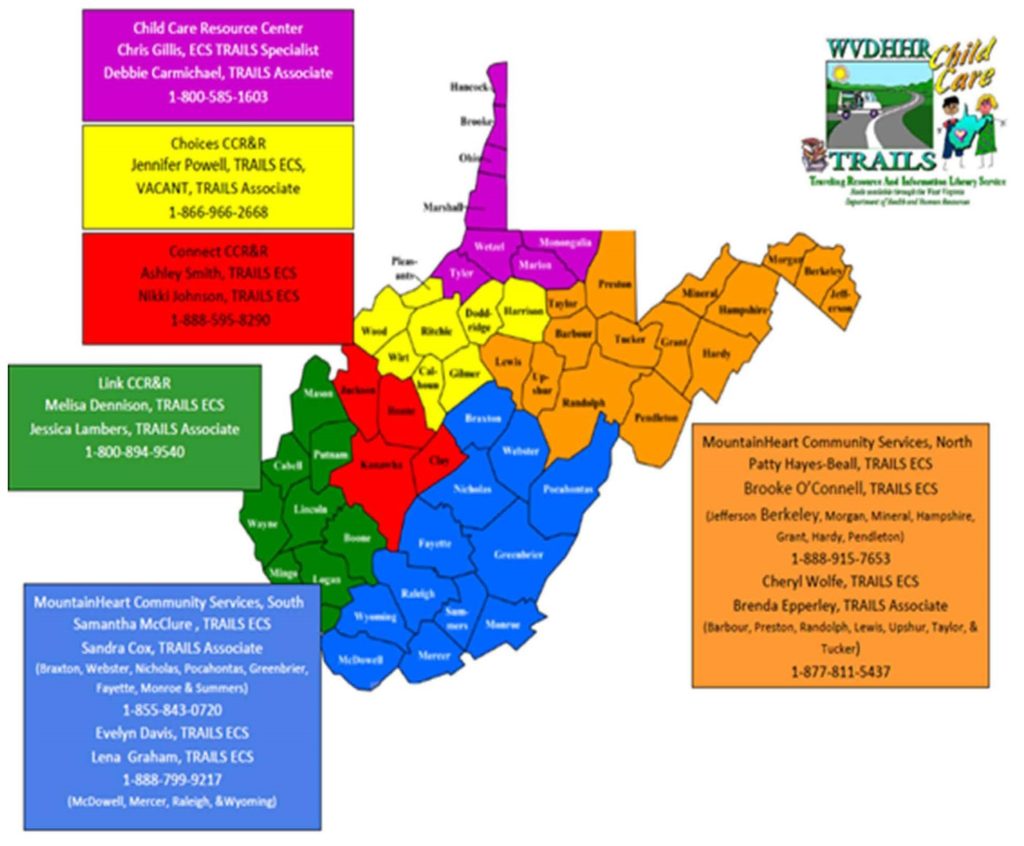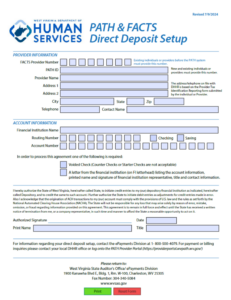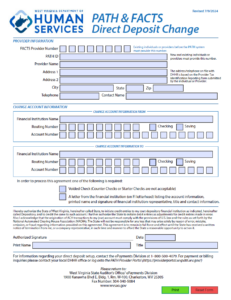Common Provider Forms
Click the Link Below For A Complete List of Forms
![]()
What Can We Do For Child Care Providers?
MountainHeart Community Services, Inc. provides a variety of free services to Child Care Providers through our Child Care Resource & Referral program.
Services for Child Care Providers include:
- Family and child referral lists to families.
- Assistance with WV state licensing, certification or registration.
- Provide information, technical assistance, and linkages on opening a child care center, family child care facility, or family child care home via a toll-free number.
- Provide workshops on child care as a business.
- Recruit and train new child care providers.
- Process payment forms for child care reimbursement to child care providers.
- Child care training specialists provide mandatory basic and advanced training on health, safety, and child development topics. Included is certificate documentation of successful completion of trainings.
- Provide information on GED, Child Development Associate (CDA), USDL Apprenticeship Child Development Specialist Certificate (ACDS), or college level classes.
- Provide access to child care resource library materials such as child care videos, books, manuals, and magazines.
- Provide loans and grants to eligible applicants to assist child care providers in meeting WV state licensing requirements or to meet ADA improvements to child care home, facility, or center. Also, provide information on other sources for child care grant and loan programs, as available.
- Provide current information, training opportunities, conferences info, state child care information, and resources.
Remember, as a child care provider, you are self-employed. You may be receiving more income per month than you ever have. Be prepared to pay the taxes on your additional income come April.
A Rewarding career
Becoming a Child Care Provider can be an extremely satisfying career. Not only is it the chance to own and run your own business, but it is also the opportunity to make a difference in a child’s life.
By providing a stable and nurturing environment, where a child can learn and grow, you can help them reach their highest potential. Children who have positive early childhood experiences are better prepared for school, college and work.
Many Family Child Care Providers start their business so they can stay home with their own young children and often continue providing services long after their children are grown.
Getting Started in Family Child Care
Some things to think about before starting a Family Child Care Home:
- Would you enjoy spending a lot of time caring for young children
- Would you enjoy communicating with parents about their children’s growth and development?
- Is your home suitable (e.g., absence of lead paint) for a family child care home?
- Does your home have sufficient space to allow you to care for young children? (Space is needed for projects and activities, indoor and outdoor active play, meals, naptime, and a sanitary diapering area.)
- Do you have outdoor play space (enclosed yard or fenced public park within easy walking distance)?
- Will your family be supportive of you running a family child care program in your home?
- If you have children of your own, will they adapt well to sharing their home with other children for a significant amount of time during the week?
- Can you keep track of the business details of running a family child care home?
Determining Need
We can help you determine the level of need in your community. You can estimate community need on your own by checking your local papers for the number of advertised openings from other child care providers. Conversely, if many parents are looking for child care, there may be a shortage of care in your area.
Community demographics, available from the town or city government, can help you estimate the need for child care. If there are many families with young children, and/or a high birth rate, you can expect that many parents may be seeking child care in the near future.
Business Issues
You will need to set up an efficient system to manage the many aspects of running a small business. Keep organized records of all your expenses and income. Maintain a separate checking account for business expenses. Save receipts, and spend time each day or week to record information. A good record-keeping system will provide the information you need for tax purposes, and will allow you to gauge your income and expenses on a regular basis. Here are some tips for the major business items that should be set up before you open your doors for business:
Tracking Income and Expenses
Develop a bookkeeping system to track each family’s fees due, payments made, balance outstanding, and other payments (e.g., state vouchers). Parents appreciate a receipt for payments, particularly if payment is made in cash. Keep your financial records in a secure place. You can request help with developing a system from us or the Small Business Administration in your area.
Expected expenses:
- Your own salary and benefits
- Educational supplies and equipment
- Food and kitchen supplies
- Cleaning and diapering supplies
- Your own professional training and development
- Advertising costs
- Insurance
- Repairs and maintenance for the space you use for children
- Other: legal fees, transportation, office supplies, etc.
Taxes
Like any small business, you will have tax responsibilities. Keep good records to use at tax time. Be sure to keep all receipts, and to track all income and expenses. When in doubt, check with your tax consultant or the Internal Revenue Service for current tax regulations.
Deductions include food served to children in your program; diapers; toys and equipment for children; liability and accident insurance; supplies (art, cleaning, office, etc.); field trip expenses; memberships and subscriptions to child care organizations; and professional development and training.
Partial deductions include use of your home for business, and depreciation of equipment used in the child care business (cribs, swing sets, high chairs, etc.)
Your child care income (less allowable expenses) will give you your net profit or loss. You must report all income, whether paid in cash, check, or other means; whether it comes from an individual or the state (if you accept vouchers, for example); and whether or not you make a profit in any given year (within certain IRS guidelines). Contact the IRS or a tax accountant to find the proper forms for filing federal, state, and social security taxes, and for the types of exemptions for which you may be eligible.
As a self-employed small business owner, you will be responsible for filing quarterly federal self-employment taxes. These are usually filed as estimated tax. Failure to file and make payments on time can subject you to interest and penalties. For more information, contact us, and you may want to contact the IRS, your state’s Revenue Department, or a tax consultant.
Insurance
Check with your state’s licensing unit and us concerning insurance requirements — and for suggestions on a group policy or an insurance agent with experience in childcare insurance.
Liability Insurance: Most homeowners have insurance, but there are special issues related to operating a child care business in the home. Talk to an agent with child care experience. Your liability insurance should include coverage for accidents, property damage, and legal fees related to any claims. You will need liability insurance if you rent your child care space, and the policy may need to indemnify the landlord as well as yourself.
Automobile Insurance: If you use your car to transport children, you will need to obtain additional insurance.
Contracts and Agreements
Set clear expectations about payments in the parent-provider agreement, which will make it easier to talk about fee issues later. Once the interviews and visits are completed, formally enroll the child into your program, and discuss any topics you may not have covered in earlier conversations. Give parents a copy of a signed contract. Some providers print a brief handbook with information about policies and program philosophy.
Prior to enrollment, parents should complete and sign release forms for situations requiring emergency medical treatment or dispensing medication, and for authorization of individuals to pick up the child from your program. Many states require annual health checkups for children in child care, with up-to-date immunization records. Health forms should be signed by the child’s pediatrician. Keep all forms on file.
Marketing
Good news travels fast, but as you start up you may find that you have vacancies. Think about different methods for advertising. First, be sure you keep your provider profile up-to-date with us. When you have openings in your program, let us know immediately. When parents are seeking care, we can refer them to your program. More and more CCR&Rs are using online marketing and child care referrals, and you should be ready for these types of referrals when the time comes.
Other marketing strategies:
- Place an ad in local newspapers; make sure your ad stands out, and give concise, specific information about your program.
- Print flyers or brochures to post on bulletin boards in places where parents are likely to go: grocery stores, children’s bookstores, laundromats, libraries, workplaces, hospitals, and colleges.
- Word-of-mouth referrals — Encourage parents to spread the word. Stay in touch with families that have used you as a provider in the past, as they may have friends or family in need of care.
- Online marketing — Spread the word about your family child care home to the wider community in your area with a website and by joining child care LISTSERVs.
The appearance of your home is a very important part of marketing your services. The inside of your home should feel inviting and comfortable. Is the area you use for child care well-organized? Does it welcome children? Bulletin boards and displays of children’s artwork can give a good impression.
Licensing and Accreditation
Many family childcare providers are interested in becoming accredited providers with the National Association for Family Child Care (NAFCC). The accreditation process helps providers meet a higher standard than the minimum required for state licensing. For more information on the accreditation process, contact NAFCC:
National Association for Family Child Care
206 Sixth Avenue, Suite 900
Des Moines, IA 50309-4018
Telephone: 819-282-8192 / Fax: 515-282-9117
Email: nafcc@nafcc.org
Facilities and Equipment
The amount of space in your home that you can devote to your childcare program will determine the amount and size of the furnishings and equipment that you’ll need to purchase. Most providers use one or two rooms in their home as program space, and the yard outside as a play area. The main idea is to make the most of the space you have!
- Store most of your supplies on shelves — up high, to allow for more space on the floor for both children and activities.
- Break your main room up into activity areas — dramatic play, book corner, sand table area, etc.
- Set aside a storage space where you can store large equipment, to allow for rotation of equipment.
- Have an area that you can use for indoor, loud, active play. Many providers use their porch, den, or living room.
- Have a designated area for nap time. It’s best to have children sleep in the same place each day.
Furnishings
Furnishings that you’ll want to purchase include:
- A table that seats four to six children
- Chairs, at least one per child
- Storage shelving units
- An easel
- Mats for nap time
- A book display stand
- Sand/water table
- Potty chairs
- A diaper changing table
Activity areas
Activity areas in your main room allow the children to focus on various developmental skills. You may choose to design your room around a particular learning activity for a few days at a time. Here are the main activity areas you’ll need, with some examples of materials and equipment for each:
- Large Motor: indoor climbing structures, play tunnels, large wooden blocks, pillows
- Art: paints, markers, stamps and ink pads, scissors, assorted papers
- Manipulatives: connecting blocks, lacing cards, peg boards, shape boxes, beads
- Sensory play: play dough, shaving cream, bubbles, sand and water toys
- Blocks: wooden blocks in various unit sizes, animal and people blocks, cardboard blocks
- Dramatic play: dress-up clothes, housekeeping/kitchen units, puppets, dolls, play foods
- Reading: books, audiotapes, felt boards, puzzles, alphabet blocks
- Science: magnifying lenses, magnets, binoculars, nature objects, charts
- Outdoor play: wagons, balls, sandbox, sand toys, tricycles, climbing structure, swing set
Definitions For Family Child Care:
Family childcare is home-based care provided for a portion of the day in a private family home for compensation. The home must be inhabited by the family/individual who is providing care, and the provider’s hours of operation may not exceed eighteen (18) hours in a 24-hour period. Under state law, only family childcare provided for 4-6 children must be regulated. Under WV Code, Chapter 49-2B-9 family childcare providers caring for fewer than four children (informal family childcare) or only for related children (relative family childcare) are exempt from state regulatory requirements. These informal and relative providers may, however, be approved in order to receive subsidy payments through the childcare certificate system. The following terms apply to these three types of family childcare providers.
Informal Family Child Care:
An informal family childcare home provides care for three (3) or fewer children. At least one (1) child is not related to the caregiver and the provider must be requesting reimbursement for at least one (1) child through the childcare certificate system. Informal childcare providers must receive approval in order to accept childcare certificate funds.
Registered Family Child Care Home:
A facility used to provide nonresidential childcare for compensation in the provider’s home. A registered provider may care for four (4) to six (6) children, including children who are living in the household, who are under six (5) years of age. No more than two (2) of the total number of children may be under twenty-four (24) months of age.
Relative Family Child Care:
A relative family childcare home provides care only to children related to the caregiver. The caregiver must be a grandparent, great grandparent, aunt, uncle, great-aunt, great-uncle or adult sibling and must be seeking reimbursement through the childcare certificate system. This type of care must receive approval in order to accept childcare funding.
Definition of Family Child Care Facility:
A family childcare facility serves groups of seven (7) to twelve (12) children for four (4) or more hours per day. The provider may care for no more than four (4) children under the age of 24 months nor more than twelve (12) children in total, including children residing in the home under the age of six (6) years. Care may be in the operator’s home or in a facility that is not inhabited by the provider.
Definition of Family Child Care Center:
A Child Care Center serves groups of thirteen (13) or more children for four (4) or more hours per day.
Additional Resources
Regulatory Requirements for Child Care Centers, Child Care Facilities, Family Child Care Homes and Informal/Relative Family Child Care Home:
https://dhhr.wv.gov/bcf/ece/policies/Pages/default.aspx
Tiered Reimbursement Rates for Child Care Providers
https://dhhr.wv.gov/bcf/ece/Provider%20Information/Pages/Tiered-Reimbursement-.aspx
If you have questions or need additional information, please contact us.
Provider Forms
General Forms (No ECE Number)
- Authorization for Protective Services Record Checks
- 2018 Informal-Relative Checklist.pdf
- Disaster Planning Form – Center & Facility
- Disaster Planning Form – Home, Informal, Relative
- Disaster Planning Form – Home, Informal, Relative & In-Home
- Child Care Provider Medical Report
- Recommended Child and Adolescent Immunization Schedule
- Request to Amend Application – 2022
- Technical Assistance Request Form
- Tiered Reimbursement
ECE Numbered Forms
- ECE-CC-0162B Change of Information Notification
- ECE-CC-1B New Employment Verification
- ECE-CC-3 Child Health Assessment
- ECE-CC-3B Statement of Good Health
- ECE-CC-7 Provider Information Form
- ECE-CC-8A PS Check
- ECE-CC-8B Statement of Criminal Record
- ECE-CC-10A Request for Payment Child Care Services
- ECE-CC-10G Child Care Attendance Sheet
- ECE-CC-10K Child Care and Responsible Pet Ownership
- ECE-CC-10J Pet Acknowledgement Form
- ECE-CC-10E Emergency Info Form
- ECE-CC-14 Letter of Intent and Needs Assessment
- ECE-CC-14 Letter of Intent and Needs Assessment (Final)
- ECE-CC-14A Facility Info Packet
- ECE-CC-15 Facility Application
- ECE-CC-23 Fire Escape Plan
- ECE-CC-25 Medication Permission Slips
- ECE-CC-26 Child Care Provider Incident Report Form
![]()
TRAILS (Traveling Resource and Information Library System)
Who makes this program possible?
The TRAILS van is a service of MountainHeart Community Services, Inc., brought to you through MountainHeart Child Care Resource and Referral, and funded by the Department of Health and Human Resources.
What is it?
The TRAILS is a mobile resource outreach program which uses a medium sized van equipped with resources of interest to early childhood providers. The major purpose of this outreach program is to allow child care resource and referral agencies to utilize a system of mobile resources, to provide one to one assistance, and distribute resources that will improve the quality and availability of childcare services.
What resources are available?
Resources include educational and developmentally appropriate toys for children ranging in ages from birth to thirteen years, children\’s books, videos, computer software, music teaching curriculum and idea books, assistive technology, art supplies, and large equipment such as highchairs and cribs.
Where are the vans found?
A TRAILS van will come directly to your individual home or center and you will be allowed to check out materials.
When can I expect a van visit?
As soon as you are a WV licensed, registered, or certified provider within MountainHeart South’s twelve county area you can call for an appointment. After your initial visit you will be placed on the van’s schedule and can expect to see the van every four to six weeks.
How can I schedule an appointment?
If you are a registered, certified, or licensed daycare provider with the Department of Health and Human Resources, Bureau for Children and Families and would like more information about TRAILS, please call at the number listed below for your county.
Providers in Raleigh, Mercer, Wyoming, or McDowell counties, call 1-888-799-9217.
Providers in Braxton, Fayette, Greenbrier, Monroe, Nicholas, Pocahontas, Summers or Webster counties, call 1-855-843-0720.
Providers in Berkeley, Grant, Hampshire, Hardy, Jefferson, Mineral, Morgan and Pendleton counties, call 1-888-915-7653.
Providers in Barbour, Lewis, Preston, Randolph, Taylor, Tucker and Upshur counties, call 1-877-811-5437.
![]()
![]()
Professional Development
We Offer Professional Development for Child Care Providers
The MountainHeart professional development Team provides professional development opportunities for the purpose of:
- Offering additional accessibility and availability to providers
- Offering additional professional development options from Introductory to Intermediate sessions
- Increasing opportunities for all providers to strengthen and increase quality as a childcare provider
Anyone Wishing To Attend Professional Development Sessions Must Be Pre-Registered In Order To Attend.
CLICK HERE FOR THE TRAINING CALENDAR AND COURSE CATALOG
If a session is canceled, registered participants will be notified.
Which Professional Development Session Is Right For Me?
Now it’s easier to choose a professional development session that meets your needs!
The description of each class will contain some additional information. Common identifiers will be classes focusing on different ages levels and managerial leadership classes.
Remember: The new regulations now say, if you work in a childcare center, you must have 6 hours of training in the age level of the children that you work with, and directors need 6 hours of management classes every year.
Important Notice
MountainHeart Professional Development Sessions are provided for the professional development of all childcare providers. To allow All Participants the opportunity to focus fully on the subject matter, we ask that you do not bring infants or children to the sessions.
We regret we are unable to provide childcare during training. Thank you for honoring our policy in this matter.
Child Care Region V Professional Development Calendar
Click the link below to view a copy of the Child Care Region V Professional Development Calendar. This region serves Barbour, Berkeley, Grant, Hampton, Hardy, Jefferson, Lewis, Mineral, Morgan, Pendleton, Preston, Randolph, Taylor, Tucker & Upshur counties.
Child Care Region VI Professional Development Calendar
Click the link below to view a copy of the Child Care Region VI Professional Development Calendar. This region serves Braxton, Fayette, Greenbrier, McDowell, Mercer, Monroe, Nicholas, Pocahontas, Raleigh, Summersville, Webster & Wyoming counties.
WV STARS Course Catalog
Visit the link below for the WV STARS Training Calendar and Course Catalog.
![]()
Direct Deposit Information
Download The Appropriate Form Below
Download Direct Deposit Setup Form
Download Direct Deposit Change Form
Direct Deposit Information for Child Care Providers
How to Set Up or Change Direct Deposit for PATH & FACTS Providers
The West Virginia Department of Health and Human Resources (DHHR) and the State Auditor’s Office have streamlined the process for providers to receive payments through direct deposit in the PATH (People Access To Help) and FACTS (Families and Children Tracking System) systems. Whether you are a new provider or need to update your banking information, here’s what you need to know.
Before You Begin
To avoid delays, ensure the following steps are completed before submitting your form:
- Verify Your Information: The name, address, and phone number on your form must match DHHR records. If you’ve moved or changed your phone number, update your information with DHHR first by contacting your local office, caseworker, or the DHHR Customer Service Center at 304-558-2400.
- Choose the Correct Form:
- Setup Form: For new providers who are not yet enrolled in PATH/FACTS direct deposit.
- Change Form: For existing providers who need to update their bank account details.
- Gather Required Documentation:
- A voided check (counter or starter checks are not accepted) with your name and address printed.
- A letter from your financial institution on official letterhead, listing:
- Account holder name
- Routing and account numbers
- Account type (checking or savings)
- Printed name, signature, title, and contact information of the bank representative.
Important Guidelines
- Forms must be signed with an ink pen—electronic signatures are not accepted.
- The date on the form must be within the last 60 days.
- Print your name exactly as signed. If signing on behalf of a business, include your title; if an individual, specify Foster Parent, Guardian, etc.
- Do not email forms. Submit by fax or U.S. mail only:
- Fax: 304-340-5084
- Mail:
West Virginia State Auditor’s Office
ePayments Division
1900 Kanawha Blvd. E, Building 1, Room W-100
Charleston, WV 25305
Provider Information Required
- FACTS Provider Number: Assigned before conversion to PATH.
- PATH ID Number: Assigned to all providers in the PATH system.
- Provider Name and Contact Information: Must match DHHR records.
Account Information Required
- Financial institution name
- Routing number (9-digit bank identifier)
- Account number
- Account type (checking or savings)
Need Help?
- For questions about payment amounts, dates, or missing checks, contact DHHR at 304-558-2400.
- For questions about direct deposit setup or changes, contact the State Auditor’s Office ePayments Division at 1-800-500-4079 or email epay@wvsao.gov.
- For provider account access, visit the PATH Provider Portal.
Note: The State of West Virginia complies with U.S. law and NACHA rules for ACH transactions. This authorization remains in effect until written notice of termination is received and processed.
![]()
![]()



